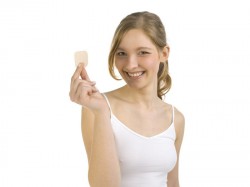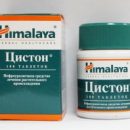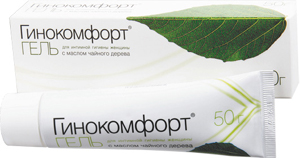Mode of application

The contraceptive plaster looks like a conventional body color leucing, and its size average is about 20 cm?. As a rule, it is glued on clean and dry skin on the first day of menstruation to the area of the blades, buttocks, abdomen or shoulders, and the replacement is produced every 7 days. This condition must, remember, only timely replacement of the plaster guarantee full protection. Thus, three patches are used during the month, then you need to make a weekly break (it should not exceed 7 days!), during which another menstruation comes. And every time you need to change the location of the patch - this will allow the emergence of a local skin reaction to a minimum of a contraceptive.
However, if you, for your convenience, want to start using the plaster on a certain day of the week (for example, Sunday), then you note that it is necessary to glue it on the first Sunday from the start of menstruation. Just remember that the first 7 days will need to additionally use non-coronal contraceptives, for example, condoms, including Women.
Operating principle

The main advantage of the contraceptive plaster before other contraceptives is the convenience of use: it is securely attached to the skin and does not affect water or sun rays. This will undoubtedly please the women leading an active lifestyle, because the use of the plaster does not exclude physical exertion, visits to the sauna, swimming pool and rest at the reservoirs. In addition, there are still a number of positive qualities:
- Unlike oral contraceptives does not require daily attention.
- Allows you not to interrupt the sexual act.
- Does not fall into the gastrointestinal tract, which means that its effectiveness will not affect the disorder of the digestive system (vomiting, diarrhea).
- Restores the regularity of the menstrual cycle, helps reduce pain syndrome.
- Easy symptoms Premenstrual syndrome.
- Able to reduce the risk of cancer of the ovaries, uterus and colon.
- Reduces the likelihood of occurrence Fibroms, Cysts and benign formations in the chest.
The following can be attributed to the following:
- The contraceptive plaster is well visible on the skin.
- Sometimes it can cause unpleasant sensations and irritation of skin.
- Can provoke an increase in blood pressure.
- First use temporary side effects: nausea, headache, Painful feelings in the chest, drowsiness, sharp mood swings, as well as bleeding from the vagina. As a rule, after 1-2 months, these symptoms disappear by themselves.
- The contraceptive plaster is not able to protect a woman from sex infections, so you should make sure that the partner is healthy. If you are not sure about this, it is better to use a condom as an additional protection.
Side effects

Cases of occurrence of side effects when using a contraceptive plaster rather rare, but not completely excluded. Therefore, it is necessary to listen to your body and in case something bothers you - immediately consult a doctor. Here is a list of possible risks:
- From the nervous system: migraine, Dizziness, tremor, alarm, depression, sleep disorders.
- Cardiovascular system can react by rapid heartbeat, edema, Varicose extension of veins, Increased pressure.
- From the gastrointestinal tract sometimes there is an increase in appetite, Gastritis, Gastroenteritis, pain in the abdomen, flatulence, diarrhea, vomot, constipation, anorexia and haemorrhoids.
- From the urogenital system: pain during sexual intercourse, vaginitis, decrease in sexual entry, increase in the mammary glands and lactation, which is not related to childbirth, mastitis, Disorders of ovarian, cysts. The likelihood of urinary tract infections increases.
- Skin reactions are often expressed in the form of urticaria, rash, itch. Acne may appear, the color of the skin can change, strengthen the sweating and dry skin drying.
- May be observed pain in the back and legs, convulsions and muscle weakness.
- Impaired visual impairment and conjunctivitis.
- Violation metabolism.
And remember that if you have received injuries or fell ill, then when contacting a specialist, you must necessarily notify that you use a contraceptive plaster. And he, in turn, determines whether his wearing is permissible and is it compatible with appointed drugs.
Contraindications

MirSoveto draws your attention to the fact that the contraceptive plaster, like any other medical drug, has a number of contraindications to use:
- The presence in the history of venous and arterial thrombosis, as well as the presence of serious factors (diabetes, arterial hypertension, hereditary predisposition), which can provoke the development of these diseases.
- Congenital predisposition to high quality and quantitative impaired blood lipoprotein.
- Frequent migraines with aura.
- Malignant neoplasms in the chest, as well as suspicion of their occurrence.
- Availability of estrogen-dependent tumors, endometrial cancer.
- Uterine bleeding.
- Menopause.
- Age under 18.
- The first four weeks after childbirth.
- Pregnancy and breastfeeding.
- Smoking (especially if the woman reached 35 years old).
- Individual intolerance to individual components of the drug.
- Overweight (more than 90 kg), which is able to reduce the effectiveness of the action of a contraceptive plaster.
And finally, I want to emphasize that hormonal contraception is a complicated and risky thing, and if you still decided to use for this purpose a contraceptive plaster, be sure to consult a gynecologist!









